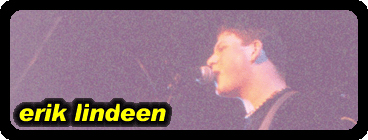|
Erik Lindeen
Erik was born in Natick, Massachusetts, which is a small coastal town twenty minutes south of Boston. Ever since he was a child, Erik was always fascinated by the beauty and power of the ocean. He started scuba diving at fourteen while on a family vacation in St. Martin, near Philipsburg. Since then, Erik dives whenever he gets the chance. Little did Erik know that his passion for diving and the ocean, or the "Great-World Sea" as he liked to call it, would set him on track towards an exciting future in marine biology.
Erik started on his Bachelors of Science in marine biology at the College of Charleston, SC, in 1998. He participated in two programs since starting college to supplement his exceptional classroom education with fieldwork: the Sea Education Association and the School for Field Studies. Erik also taught scuba diving and volunteered as a first responder.
Before his sophomore year, Erik taught a summer class in Ichthyology (the biology of fishes) at the Duke University Marine Lab. While there, he was awarded the Our World-Underwater internship at the University of North Carolina Wilmington. The six-week internship was lengthened to three months when Erik volunteered to help further with the rapid assessment and monitoring program known as Aquarius.
The Aquarius project brought together some of the world�s foremost specialists in an attempt to evaluate the community structure and coral condition at Conch Reef, located in the Florida Keys National Marine Sanctuary - home to the largest network of marine protected areas in the United States. There are two main objectives during the Aquarius mission. First, it will revisit permanent photographic monitoring stations that were established in 1994 and resampled in 1998 as part of Aquarius missions led by Dr. Gittings. Second, it will expand the "rapid assessment" monitoring program to multiple sites and depths at Conch Reef, focusing on deep reef habitats that are difficult to study using conventional scuba diving techniques.
Things were going so well with the project, that Erik was eventually hired in December 1999, as a research assistant. Through working on the rapid assessment and monitoring program, he has learned a great deal about corals, scientific computer programs, and research methods. During this mission, Erik will help provide surface support for the aquanauts. He will also help with still & video cameras and the transfer of data.
In his spare time Erik likes to do things outdoors. He also likes to visit family and friends, work on his underwater photography, or play with local bands.
|






